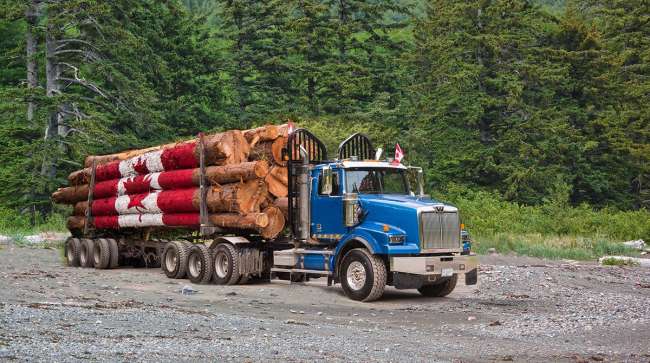(mntnvision/Getty Images)
The U.S. is poised to more than double duties on Canadian softwood lumber to 34.45%, putting more pressure on U.S. materials costs even before President Donald Trump places any new tariffs on the sector.
The U.S. currently levies countervailing and anti-dumping duties totaling 14.4%, a level that was set last year. Those are now set to rise another 20 percentage points, according to a Department of Commerce memo.
Trump has threatened, but not yet imposed, further import taxes on lumber. The president has ordered a national security investigation into U.S. imports of wood and has said the U.S. doesn’t need Canada’s. But U.S. homebuilders have warned that more tariffs will only drive up the cost of new housing.
The current duties are the result of a trade dispute between Canada and the U.S. that has been dragging on for decades. The U.S. claims Canadian sawmills are subsidized because forests north of the border are largely owned by provincial governments, which they allege set low fees, known as “stumpage” rates, to undercut the market. Canada denies this.
READ MORE: Tariffs on Canada Lumber Risk Pinching Toilet Paper Supply
“Our stumpage system is grounded in market principles, with timber sold through open, competitive auctions,” Kurt Niquidet, president of the British Columbia Lumber Trade Council, said in an emailed statement.
Deepti Yenireddy of Boon.ai explores how artificial intelligence is transforming workflows in the trucking industry. Tune in above or by going to RoadSigns.ttnews.com.
That’s separate from the barrage of tariffs being imposed by the White House in Trump’s second term, which include tariffs on Canadian products that aren’t in compliance with the U.S.-Mexico-Canada trade accord and separate 25% tariffs on steel, aluminum and automobiles.
Lumber is a major industry in Canadian provinces including British Columbia and Quebec. British Columbia Premier David Eby said he will discuss the new duties with Prime Minister Mark Carney on April 7 and called the new rates “an attack on forest workers and British Columbians,” adding they’d increase housing costs “for Americans who voted for a president who promised to lower costs.”
Canada’s practices cause “everyday egregious harm to the U.S. industry,” U.S. Lumber Coalition Chairman Andrew Miller said in a statement. “These unfair trade practices are designed by Canada to maintain an artificially inflated U.S. market share for Canadian products and force U.S. companies to curtail production, thereby killing U.S. jobs.”
New duties come on the back of other pressures such as higher input costs, wildfires, and a mountain pine beetle outbreak that has affected tens of millions of acres of forests in western Canada.
In Quebec, the second-largest producing region in the country, industry executives are struggling to see past the pressures and now a wall of U.S. trade barriers.
“At today’s prices, it’s an unequivocal dead end,” said Frederic Verreault, vice president of corporate affairs at Les Chantiers de Chibougamau Ltee., a major Quebec wood processor selling roughly half of its products to the U.S.
“A two-by-four piece will sell for about C$3 ($2.11) today, but the same piece was selling for more than C$10 in 2022, even though our production costs have risen.”







